Papers by Marcelo Durão Rodrigues da Cunha
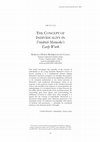
Revista de Teoria da História, Goiânia, v. 26, n. 2, p. 60–82, 2023, 2023
This article investigates the centrality of the concept of
individuality in the young Friedrich M... more This article investigates the centrality of the concept of
individuality in the young Friedrich Meinecke’s theory of
history, positing it as a fundamental element shaping
Meinecke’s historical conception. To elucidate this position,
an analysis is conducted to discern the significance attributed
to the principium individuationis at two critical junctures in
Meinecke’s early intellectual development: firstly, in his
response to the positivist assault on the German historical
school, and secondly, in his endeavor to reconceptualize the
underpinnings of a revitalized history of ideas between the
late 1800s and the initial decade of the twentieth century. By
expounding upon these aspects and contextualizing the
intellectual evolution in which these ideas emerged, it is
argued that the concept of individuality functioned as a
theoretical refuge against what Meinecke perceived as the
doctrinaire nature of worldviews incompatible with notions
of freedom and spontaneity — principles he considered
intrinsic to the historical mode of thought.
REVISTA DE HISTÓRIA, 2023
Tendo como base estudos transnacionais que apontam para a relevância do historicismo enquanto con... more Tendo como base estudos transnacionais que apontam para a relevância do historicismo enquanto conceito-chave do pensamento histórico, neste artigo objetivamos revisitar a reapropriação do termo, realizada na obra tardia de Sérgio Buarque de Holanda. De forma geral, buscamos sustentar que a aproximação do autor com o historicismo representou o capítulo brasileiro de uma tendência à relativização e adaptação do conceito
moderno de história à realidade multiétnica e multicultural da América Latina. Assim, desenvolvemos a hipótese de que, em especial no texto O atual e o inatual em L. von Ranke (1974), Sérgio Buarque se preocupava com o processo de crise da velha matriz europeia de entendimento da história na modernidade, atentando para percepções alternativas e
descontínuas sobre a questão do sentido na história.
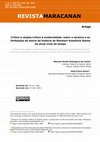
Revista Maracanan, 2021
Este artigo tem o objetivo de esclarecer o lugar ocupado pela crítica à utopia nos escritos teóri... more Este artigo tem o objetivo de esclarecer o lugar ocupado pela crítica à utopia nos escritos teóricos de Reinhart Koselleck, buscando explorar aquilo que é entendido pelo historiador alemão como o fenômeno de temporalização da utopia. Para tanto, procuramos em um primeiro momento esclarecer o significado da noção de temporalização na obra desse autor, a entendendo como parte central para a compreensão da teoria koselleckiana dos tempos históricos e de sua crítica à modernidade. Em seguida, analisamos a importância assumida pela crítica à utopia no trabalho do historiador desde a escrita da obra Crítica e crise (1959), a compreendendo como parte de sua tentativa de apreensão dos fenômenos da despolitização e do surgimento das modernas filosofias da história no século XVIII europeu. Finalmente, o trato com esses pontos é o que nos permite desenvolver os dois objetivos gerais pretendidos com a escrita do presente artigo: demonstrar a centralidade da noção de utopia – e de sua crítica – nos escritos teóricos de Koselleck e discutir em que medida as soluções empreendidas pelo historiador ao esgotamento da lógica moderna de
interpretação utópica da mudança histórica se constituem como respostas plausíveis para se superar a crise contemporânea do tempo, sobretudo, nas periferias do mundo ocidental.
Revista de Teoria da História, 2020
Resenha de: SIMON, Zoltán Boldizsár. History in Times of Unprecedented Change: A Theory for the 2... more Resenha de: SIMON, Zoltán Boldizsár. History in Times of Unprecedented Change: A Theory for the 21st Century. Bloomsbury Publishing, 2019.
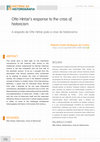
História da historiografia, 2020
This article aims to shed light on the theoretical contributions of the historian Otto Hintze to ... more This article aims to shed light on the theoretical contributions of the historian Otto Hintze to the intellectual context experienced by German historical science in the late nineteenth and the first half of the twentieth century. To do so, I proceed from the assumption that Hintze’s positions were constituted as an attempt to answer the crisis of historicism: namely, the collapse of trust in the Western-centered concept of history in modern times. From that previous definition, I argue that his individual ethics derived from what I describe as his two main theoretical contributions, developed to overcome such a crisis: the desacralization of modern state politics and his scientific reconceptualization of historicism. Finally, I claim that both the crisis of historicism itself and the responses offered by Hintze to overcome it remain largely present to reflect on some of the challenges professional historiography still faces in the twenty-first century.
Locus (UFJF), 2020
Este artigo tem o objetivo de produzir uma interpretação do legado intelectual de Jacob Burckhar... more Este artigo tem o objetivo de produzir uma interpretação do legado intelectual de Jacob Burckhardt à luz de debates historiográficos recentes que tratam da relação entre a história e a crise da teologia protestante de língua alemã ao longo do Oitocentos. Para tanto, buscarei sustentar a hipótese de que a teoria burckhardtiana da história — com sua ênfase estética nos ideais de formação e de contemplação — pode, em grande medida, ser lida como a mais bem acabada de suas respostas à crise surgida a partir desse contato entre a crença religiosa e a ciência histórica no século XIX.
Breve notícia biográfica sobre Gustav Adelbert von Koenigswald (1863-1911), 2019
RODRIGUES DA CUNHA, Marcelo D.; BENTIVOGLIO, Julio Cesar . Breve notícia biográfica sobre Gustav... more RODRIGUES DA CUNHA, Marcelo D.; BENTIVOGLIO, Julio Cesar . Breve notícia biográfica sobre Gustav Adelbert von Koenigswald (1863-1911). In: Júlio Bentivoglio. (Org.). Coleção história dos povos indígenas no Espírito Santo: os Krenak. 1ed.Vitória: Milfontes, 2019, v. 4, p. 93-100.
Alun Munslow, posmodernismo e desconstrucionismo na História, 2019
RODRIGUES DA CUNHA, Marcelo D.; BRITO, T. . Alun Munslow, posmodernismo e desconstrucionismo na H... more RODRIGUES DA CUNHA, Marcelo D.; BRITO, T. . Alun Munslow, posmodernismo e desconstrucionismo na História. In: Júlio Bentivoglio; Alexandre de Sá Avelar. (Org.). O Futuro da História: Da crise à reconstrução de teorias e abordagens. 1ed.Vitória: Milfontes, 2019, v. 1, p. 203-226.
BENTIVOGLIO, Julio Cesar ; RODRIGUES DA CUNHA, Marcelo D. . Walter Benjamin, testemunha da crise do historicismo alemão durante a República de Weimar. In: Júlio Bentivoglio; Augusto de Carvalho. (Org.). Walter Benjamin: testemunho e melancolia. 1ed.Serra: Milfontes, 2019, v. 1, p. 115-140., 2019
In: Julio Bentivoglio; Veronica Tozzi. (Org.). Do passado histórico ao passado prático: 40 anos de Meta-história, 2017
This article aims at an understanding of the relations between the German modern historical scien... more This article aims at an understanding of the relations between the German modern historical science with elements of Christian theology and religion. By thinking historicism in Wolfgang Hardtwig’s terms – as a form of religion of history (Geschichtsreligion) –, we aim at a two case studies about the works and biographies of Wilhelm von Humboldt (1767-1835) and Leopold von Ranke (1795-1886). Both are considered the founding fathers of German modern thought and, in their writings, it is possible to grasp how contemporary historical consciousness arose in synchrony with the religious world nexus as produced by protestant theology. By analyzing that transposition process, we have the objective of contributing to some historiographical tendencies which in the last decades aimed rethinking the links between science and religion in modern western thought.
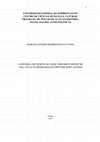
Tese de doutorado, 2017
O presente trabalho pretende fornecer uma nova interpretação para a crise vivida pela consciência... more O presente trabalho pretende fornecer uma nova interpretação para a crise vivida pela consciência histórica alemã entre o final do século dezenove e a primeira metade do século vinte. Denominada por muitos intérpretes como a "crise do historicismo", defendemos a hipótese de que esse não foi um problema enfrentado apenas por acadêmicos e intelectuais, mas sim pela própria concepção de história inaugurada a partir da experiência temporal dos homens europeus na modernidade. Nas discussões sobre o significado da história e do conceito de historicismo que tiveram lugar entre intelectuais alemães da segunda metade do Oitocentos em diante, é possível evidenciar um amplo debate a respeito dos limites inerentes ao sentido dessa história experimentada como um "singular coletivo" em tempos modernos. De modo a demonstrar essa hipótese, tratamos dos trabalhos e das trajetórias de vida de alguns intelectuais envolvidos nas contendas sobre o historicismo, atentando principalmente para a sua preocupação com o problema do sentido - sobretudo a partir dos seus vínculos com a religião e com o Estado-nação - e para o que seriam as consequências do colapso daquela crença no significado absoluto assumido pela história na era moderna. Finalmente, essa tese desenvolvida em nossos capítulos iniciais permitiu a realização da nossa própria interpretação do trabalho de Friedrich Meinecke (1862-1954), historiador que acreditamos ser central para a compreensão não só desse processo de dissolução do moderno conceito de história como da própria maneira pela qual parte da tradição de pensamento histórico alemão reagiu à crise da história no final do Oitocentos até o fim da Segunda Guerra Mundial. Sustentamos, por fim, que todo o trabalho de Meinecke - com especial ênfase na sua definição de historicismo - como historiador pode ser entendido como uma tentativa de resposta e de superação dessa crise vivida pela concepção moderna de história ao menos desde meados do século dezenove na Alemanha.
Todos os direiros reservados. A reprodução de qualquer parte desta obra, por qualquer meio, sem a... more Todos os direiros reservados. A reprodução de qualquer parte desta obra, por qualquer meio, sem a autorização dos autores, constitui violação da LDA 9610/98.
Resenha da obra NIKLAS, Olsen. History in the Plural: an Introduction to the Work of Reinhart Kos... more Resenha da obra NIKLAS, Olsen. History in the Plural: an Introduction to the Work of Reinhart Koselleck. New York: Berghahn Books, 2012. 346 p.
--------------------------------------------------------------------------------------
A review of the work NIKLAS, Olsen. History in the Plural: an Introduction to the Work of Reinhart Koselleck. New York: Berghahn Books, 2012. 346 p.

The present work intends to serve as an introduction to the social thought and the historical eth... more The present work intends to serve as an introduction to the social thought and the historical ethics of the German intellectual Gustav von Schmoller (1838-1917), an important member of the Social Policy Association (VereinfürSocialpolitik) and a prominent historian in the German Empire by the end of the nineteenth and in the beginning of the twentieth centuries. By first releasing an explanatory biography, a historical contextualization of the forming of the so-called "New" German Historical School of Economics with the understanding of its social-historical backgrounds will then be intended. In a second part, a discussion of the scholar's theoretical and methodological presuppositions related to the issue of ethics and objectivity in the historical knowledge in its association to the social issues will latter be proposed. Finally, considering nineteenth-century philosophical debates around "values" in humanities knowledge production, Schmoller's position against those and other epismological challenges of the modern era will then be analyzed.

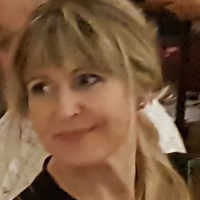

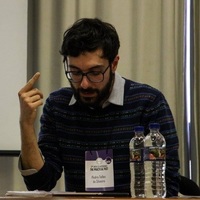



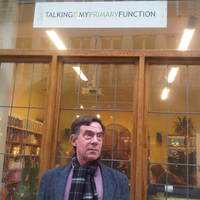
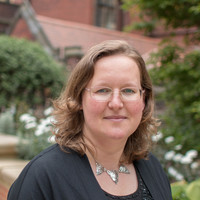


Uploads
Papers by Marcelo Durão Rodrigues da Cunha
individuality in the young Friedrich Meinecke’s theory of
history, positing it as a fundamental element shaping
Meinecke’s historical conception. To elucidate this position,
an analysis is conducted to discern the significance attributed
to the principium individuationis at two critical junctures in
Meinecke’s early intellectual development: firstly, in his
response to the positivist assault on the German historical
school, and secondly, in his endeavor to reconceptualize the
underpinnings of a revitalized history of ideas between the
late 1800s and the initial decade of the twentieth century. By
expounding upon these aspects and contextualizing the
intellectual evolution in which these ideas emerged, it is
argued that the concept of individuality functioned as a
theoretical refuge against what Meinecke perceived as the
doctrinaire nature of worldviews incompatible with notions
of freedom and spontaneity — principles he considered
intrinsic to the historical mode of thought.
moderno de história à realidade multiétnica e multicultural da América Latina. Assim, desenvolvemos a hipótese de que, em especial no texto O atual e o inatual em L. von Ranke (1974), Sérgio Buarque se preocupava com o processo de crise da velha matriz europeia de entendimento da história na modernidade, atentando para percepções alternativas e
descontínuas sobre a questão do sentido na história.
interpretação utópica da mudança histórica se constituem como respostas plausíveis para se superar a crise contemporânea do tempo, sobretudo, nas periferias do mundo ocidental.
--------------------------------------------------------------------------------------
A review of the work NIKLAS, Olsen. History in the Plural: an Introduction to the Work of Reinhart Koselleck. New York: Berghahn Books, 2012. 346 p.
individuality in the young Friedrich Meinecke’s theory of
history, positing it as a fundamental element shaping
Meinecke’s historical conception. To elucidate this position,
an analysis is conducted to discern the significance attributed
to the principium individuationis at two critical junctures in
Meinecke’s early intellectual development: firstly, in his
response to the positivist assault on the German historical
school, and secondly, in his endeavor to reconceptualize the
underpinnings of a revitalized history of ideas between the
late 1800s and the initial decade of the twentieth century. By
expounding upon these aspects and contextualizing the
intellectual evolution in which these ideas emerged, it is
argued that the concept of individuality functioned as a
theoretical refuge against what Meinecke perceived as the
doctrinaire nature of worldviews incompatible with notions
of freedom and spontaneity — principles he considered
intrinsic to the historical mode of thought.
moderno de história à realidade multiétnica e multicultural da América Latina. Assim, desenvolvemos a hipótese de que, em especial no texto O atual e o inatual em L. von Ranke (1974), Sérgio Buarque se preocupava com o processo de crise da velha matriz europeia de entendimento da história na modernidade, atentando para percepções alternativas e
descontínuas sobre a questão do sentido na história.
interpretação utópica da mudança histórica se constituem como respostas plausíveis para se superar a crise contemporânea do tempo, sobretudo, nas periferias do mundo ocidental.
--------------------------------------------------------------------------------------
A review of the work NIKLAS, Olsen. History in the Plural: an Introduction to the Work of Reinhart Koselleck. New York: Berghahn Books, 2012. 346 p.
OBJETIVOS
Discutir o que é historiografia e como pensá-la como um objeto historiográfico à luz de algumas interpretações mais correntes; Analisar as aproximações dos estudos de história da historiografia com a chamada história intelectual; Apresentar aos alunos alguns momentos decisivos de estudos sobre a teoria da história na produção historiográfica brasileira; Compreender o sentido, as abordagens, os paradigmas, os temas e as preocupações mais gerais dos estudos devotados ao campo da teoria da história no Brasil nos séculos XIX, XX e início do XXI. CONTEÚDO PROGRAMÁTICO (Título e descriminação das Unidades)
Abordagem aprofundada de aspectos da percepção histórica surgida ao longo da modernidade.
OBJETIVOS
O objetivo central é debater as características de pensamento que permitiram o surgimento da disciplina científica " História " e as mudanças nesse sentido ao longo da modernidade. Discutir o que é historiografia e como pensá-la como um objeto historiográfico à luz de algumas interpretações mais correntes; Apresentar aos alunos alguns momentos decisivos de estudos sobre a teoria e a filosofia da história na produção historiográfica ocidental, com especial ênfase na tradição historicista alemã; Compreender o sentido, as abordagens, os paradigmas, os temas e as preocupações mais gerais dos estudos devotados ao campo da teoria da história no sociedade ocidental ao longo dos séculos XVII, XVIII, XIX e XX.
CONTEÚDO PROGRAMÁTICO (Título e descriminação das Unidades)
Participants: Marcelo Durão Rodrigues da Cunha (Instituto Federal do Espírito Santo in Brazil),
Ewa Domańska (Faculty of History, Adam Mickiewicz University in Poznań, Poland), Jarosław Jaworek (Faculty of History at Adam Mickiewicz University in Poznań), Michał Kępski (Doctoral School of Humanities at Adam Mickiewicz University in Poznań, Poland), Taynna M. Marino (Doctoral School of Humanities at Adam Mickiewicz University in Poznań, Poland), Hugo Merlo (Doctoral School of Humanities at Adam Mickiewicz University in Poznań, Poland), Moira Pérez (Argentine National Council of Scientific and Technical Research and University of Buenos Aires), Julia Freire Perini (Universidade Federal do Espírito Santo), Blas Radi (Department of Philosophy, University of Buenos Aires, Argentina), Mikołaj Smykowski Department of Anthropology and Ethnology, Adam Mickiewicz University in Poznań, Poland), Monika Stobiecka (Faculty of Liberal Arts, University of Warsaw, Poland).
https://hhmagazine.com.br/geopolitics-of-knowledge-histories-heritages-and-futures-east-central-europe-and-south-america-in-a-comparative-perspective/